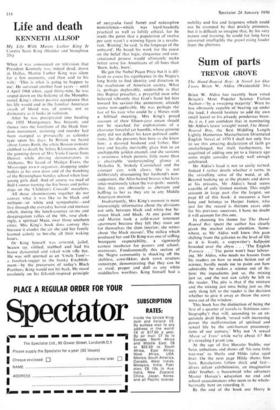Life and death
KENNETH ALLSOP
My Life With Martin Luther King Jr Coretta Scott King (Hodder and Stoughton 35s) When it was announced on television that President Kennedy was indeed dead, down in Dallas, Martin Luther King was silent for a few moments, and then said to his wife: 'This is what is going to happen to me'. He survived another four years — until 4 April 1968 when, aged thirty-nine, he was sniped down on the balcony of the Memphis motel. King's almost passive acceptance that his life would end in the familiar American swish of blood was, of course, not so divinatory as it looks in isolation.
After he was precipitated into heading the 1955 Montgomery bus boycott, and thence into the forefront of the black free- dom movement, maiming and murder had been stamped as prosaically as calendar type upon his days. In Britain we heard about James Reeb, the white Boston minister clubbed to death by Selma Klansmen, about the gunning down of Mrs Viola Liuzzo from Detroit while driving demonstrators in Alabama. We heard of Medgar Evers, the Mississippi NAACP organiser, dropping under bullets at his own door and of the bombing of the Birmingham Sunday school when four young girls died. And of course we read of Bull Connor turning the fire hoses and police dogs on the 'Children's Crusade' marchers.
All those abominations together do not convey what it was like to be black and militant—or white and sympathetic—and live through the everyday hatred and menace which, during the lunch-counter sit-ins and desegregation rallies of the '60s, rose chok- ingly, a spiritual Mace, over those southern cities. Mrs King's book does convey this because it exudes the air she and her family learned calmly to breathe all their waking hours.
Dr King himself was arrested, jailed, beaten up, vilified, stabbed and had his house dynamited and raked with rifle fire. He was still spurned as an 'Uncle Tom'— a forelock-tugger to the honky Establish- ment—by the precursors of today's Black Panthers. King would not hit back. He stood resolutely on his Ghandi-inspired principle
of satygraha (soul force) and redemptive nonviolence—which was hard-headedly practical as well as loftily ethical, for he made the point that a population of twelve per cent wasn't a winning figure in a revolu- tion. 'Rioting', he said, 'is the language of the unheard'. He based his work for the cause on the belief that logic, eloquence and con- stitutional protest would ultimately make better sense for Americans of all hues than 'Burn, baby, burn'.
He got the Nobel Peace Prize but it is dif- ficult to assess his significance in the Negro's long battle to find identity and direction in the maelstrom of American society. What is, perhaps deplorably, undeniable is that this Baptist preacher, a prayerful man who believed vibrantly that God's hand led him toward his saviour-like atonement, already seems non-applicable. He was perhaps the last of his race who could be a Moses with a biblical meaning. Mrs King's proud account of their fifteen-year union should not be searched for explanations of a character forceful yet humble, whose genuine piety did not deflect his keen political ambi- tions, for she presents him here as she knew him : a devoted husband and father. Her love and loyalty inevitably glaze him in an unchippable golden enamel, and she sustains a sweetness which permits little more than a • charitable 'understanding' glance at Malcolm X, Stokely Carmichael and the younger cats with claws. She is not deliberately discounting her husband's non- supporters, the Afro-haired braves who have since mutinously taken the war-path: merely that they are obviously as aberrant and baffling to her as they are to any Middle American matron.
Inadvertently, Mrs King's memoir is most interestingly informative about the divisions not only between black and white but be- tween black and black. At one point she and Martin took a cold-water tenement apartment because they felt they must see for themselves the slum interior; she writes about 'the black masses'. The milieu which produced her and Dr King was one of stifling bourgeois respectability, a rigorously earnest incubator for pastors and school- mistresses. Fundamentally this section of the Negro community is shucking off the shiftless, corn-likker, dark town strutters stereotype, demonstrating that they can be as staid, proper and dull as any white middleclass worthies. King himself had a
nobility and fire and largeness which could not be cramped by that prickly primness, but it is difficult to imagine that, by his very nature and training, he could for long have answered intelligibly the growl rising louder from the ghettoes.






































 Previous page
Previous page